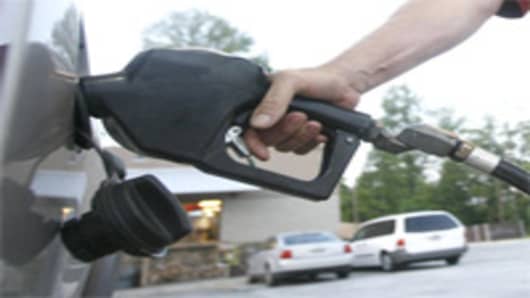While oil has fallen sharply since May, gasoline is down just about 10 percent and it is not likely to drop below $3 any time soon.
Investors have watched West Texas Intermediate crude drop like a rock on the Nymex, down more than 20 percent from its peak of just above $115 to around $93 a barrel Monday. But Brent , which is a better reflection of global oil prices, at about $111, is down just $15 from its high.
"Unfortunately, the most expensive grade of crude determines the price of gasoline," said Tom Kloza, chief oil analyst at OPIS. "Brent is the most expensive. It represents crude on the water."
Gasoline prices have dropped to $3.64 a gallon nationally from a peak of $3.98 in mid-May, according to AAA. Diesel prices at the pump have fallen more slowly but are beginning to catch up and are now averaging $3.97 a gallon.
"We may get down to that $3 to $3.25 neighborhood for some states that have lower taxes and cheaper supply," said Kloza. But the coasts, specifically the Northeast, will not see as much relief because of its dependence on higher grade imported oil. The loss of Libya's light sweet crude output continues to crimp those supplies.
"The price of the sweetest, lightest, least troublesome crude is to a great extent determining the price of gasoline on the coast. I do think you're going to see prices drop more in the nation's interiors. Chicago, Detroit, Minneapolis, Ohio. They saw some of the most spectacular increases. They're going to drop more. For the coasts, and the country as a whole, we're not really going to drop that much unless we see Brent prices come off," Kloza said.
Andy Lipow, president of Lipow Oil Associates, said gasoline could fall as much as another $0.10 a gallon nationally by July 4, but after that, the situation is uncertain. "We could see further declines, but I think that's heavily dependent on how the situation in Greece pans out and affects the value of the euro to the dollar," he said.
He and Kloza said if Greece were to default, Brent would immediately drop because of the potential ripples across Europe's economy. "If you're hoping for $2.50 to $2.75 gas prices, you probably don't realize it, but you're hoping for a recession," said Kloza.
An improving economy could also keep prices high. Kloza said his concern is that oil and gasoline could be pricier next winter and spring, if the global economy improves and supplies tighten.
"Last week, the International Energy Agency came out and warned that by the end of the year, we might have demand butting right up against supply," said Kloza, adding that may have been the IEA 's way of pressuring OPEC. "It's a real tightrope."
Oil produced mid continent and in Canada can be processed in the Midwest or Gulf Coast refineries, and that domestic crude supply is abundant. While the Saudis are providing more crude to make up for the loss of 1.4 million barrels a day from Libya, the East Coast refineries cannot process the sour crude, and the tankers head instead to Gulf Coast refineries, which were configured to handle it.
"Clearly, the spread between Brent and WTI is impacting the price of gasoline, especially on the East Coast. Nearly every crude that's imported is priced in Brent," Lipow said. Besides Libya, the East Coast imports oil from Nigeria, Angola, Azerbaijan, Kazakhstan, and Norway.
"The U.S. consumes 9 million barrels of gasoline per day, and of that 9 million, 10 percent is imported and nearly every bit of those imports go right to the East Coast," said Lipow.
Lipow said gasoline prices are also being held higher than they might have been because many of the retail stations are no longer owned by oil majors, which can respond more easily to price changes.
Questions? Comments? Email us at marketinsider@cnbc.com



